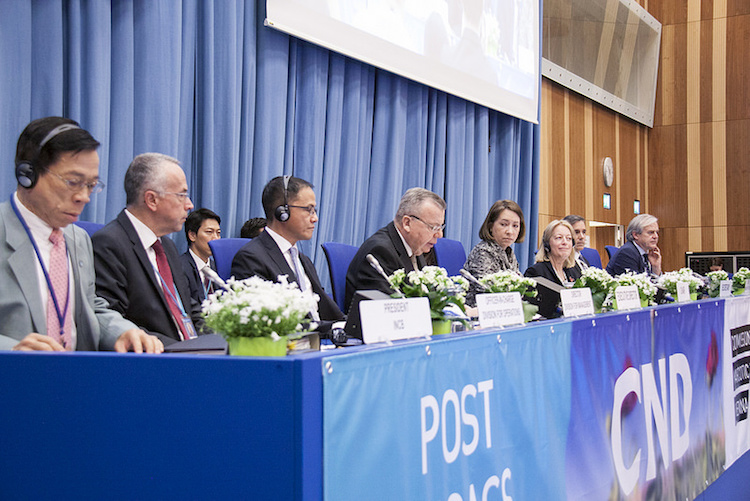By Jaya Ramachandran
VIENNA (IDN) – Enhancing international cooperation to combat the synthetic opioid crisis, removing stigma as a barrier to the availability and delivery of health care and social services for people who use drugs is part of eleven resolutions the 61st session of the Commission on Narcotic Drugs (CND) has endorsed. The five-day gathering from March 12-16 in Vienna also started preparations for the CND’s ministerial segment at the 2019 session.
Secretary-General António Guterres said in a video message at the opening session of the 61st Commission on Narcotic Drugs: “With the UN General Assembly special session consensus as our blueprint, we can promote efforts to stop organized crime while protecting human rights, enabling development and ensuring rights-based treatment and support.”
“I have called on the United Nations Office on Drugs and Crime [UNODC] to develop a comprehensive strategy that works across the three pillars with other UN entities to advance our efforts,” he stressed, referring to the three main pillars of the UN’s work – peace and security, human rights, and development.
UNODC Executive Director Yury Fedotov said that throughout the coming year, the agency is looking forward to continuing its lead role in the UN’s strategic work on drug issues.
“The Commission on Narcotic Drugs has proven time and again its value in bringing the world together – Member States, UN agencies, regional organizations, civil society, young people and scientists,” he said.
“The political commitment, expertise and experience gathered here represent a vital resource as we seek to find balanced, integrated solutions, drawing on the mutually supportive and reinforcing international drug control conventions and human rights obligations, and working towards the Sustainable Development Goals,” Fedotov underscored.
The opening session was also addressed by the President of the International Narcotics Control Board, Dr. Viroj Sumyai, and featured a video message from WHO Director-General Tedros Adhanom Ghebreyesus.
At this session, UNODC and WHO [the World Health Organization] presented a new report on treatment and care for people with drug use disorders in contact with the criminal justice system, and addressing alternatives to conviction or incarceration.
Over the following week, the session, chaired by Ambassador Alicia Buenrostro Massieu of Mexico, considered a variety of resolutions, such as on combating the synthetic opioid crisis, strengthening drug prevention in schools and measures to prevent mother-to-child HIV transmission.
“UNODC remains committed to supporting you in all your efforts to improve balanced, evidence-based responses to the challenges to health, security, safety and development posed by drugs,” he concluded.
Along with the Commission on Crime Prevention and Criminal Justice, the Commission on Narcotic Drugs serves as the central policymaking body within the UN system on drugs. It is one of UNODC’s governing bodies, and its resolutions and decisions provide guidance to Member States, UNODC and the international community.
Speaking at the closing session, Fedotov commended the efforts of the CND to discuss and agree joint solutions, and highlighting the importance of consensus in addressing world drug challenges.
“Consensus is the shared conviction that working together, we can solve common problems,” he said. “This is true whether we are talking about ensuring access to pain-relieving medicines, stopping organized crime and trafficking, enabling alternative development or ensuring evidence-based treatment and support.”
“It is a great strength of the Commission on Narcotic Drugs that it has been able to build, and continue building on, a hard-won consensus to address the complex challenges posed by drugs, with the international conventions as our foundation and the Sustainable Development Goals as our objective.”
The Session also agreed to schedule six analogues of fentanyl, including carfentanil, under the international drug control conventions. Abuse of fentanyl, which is 100 times more potent than morphine, has led to thousands of overdose deaths around the world.
The Commission on Narcotic Drugs serves as the central policymaking body within the United Nations system on drugs. Along with the Commission on Crime Prevention and Criminal Justice, it is one of the governing bodies of UNODC. Its resolutions and decisions provide guidance to Member States, UNODC and the broader global community. [IDN-InDepthNews – 17 March 2018]
Photo: Opening session of 61st Session of the Commission on Narcotic Drugs on March 12, 2018 in Vienna by UNODC Executive Director Yury Fedotov (fourth from left). Credit: UNODC
IDN is flagship agency of the International Press Syndicate.
facebook.com/IDN.GoingDeeper – twitter.com/InDepthNews

